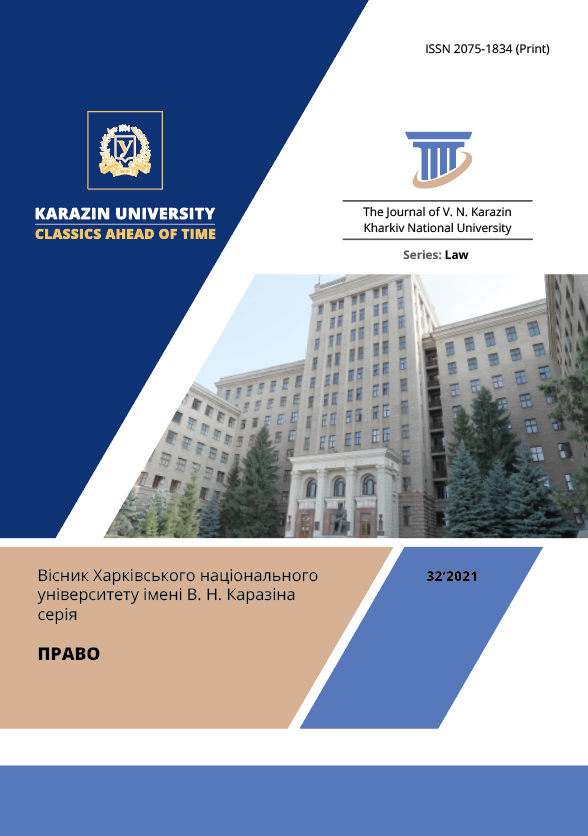ІНФОРМАЦІЙНА БЕЗПЕКА СУБ’ЄКТІВ ТРУДОВОГО ПРАВА
Анотація
Вступ. Процеси цифровізації бізнесу, запровадження нових форм організації виробництва і праці значно випереджають урегулювання таких інновацій у правничому середовищі.
Постановка проблеми. Архаїчність трудового законодавства порівняно з тенденціями розвитку цифрової економіки спричиняє виникнення підстав для зниження рівня інформаційної безпеки суб’єктів трудових правовідносин.
Актуальність обумовлена недосконалістю нормативного врегулювання основних засад інформаційної безпеки, застарілістю норм трудового законодавства, низьким рівнем цифрової культури населення України, внаслідок чого виникає нагальна потреба у дослідженні інформаційної безпеки суб’єктів трудового права.
Мета. Вивчення шляхів модернізації механізмів забезпечення інформаційної безпеки роботодавців та працівників, викликане тенденцією до поєднання трудових відносин з інформаційними технологіями.
Методи. Теоретичні та загальнонаукові (аналіз, синтез, систематизація), емпіричний метод (метод порівняння).
Основні результати дослідження. Міжнародно-правове регулювання значно випереджає розвиток національного законодавства щодо інформаційної безпеки. Український законодавець вбачає у цьому процесі ілюзорність, оминаючи масштабність технологічного розвитку та можливих «цифрових» проблем. Дедалі більше процес праці переміщується у віртуальний простір. Ця тенденція створила умови для успішного розвитку цифрових трудових платформ. Учасники трудових правовідносин в Україні потребують оновлення механізмів захисту від інформаційних загроз, пов’язаних з діджиталізацією діяльності, а також модернізації захисту трудових прав працівників. З метою створення належних умов праці, роботодавці повинні контролювати трудову діяльність робітників, але у способи, що не порушують їх основоположних прав і свобод.
Висновки. Обов’язок забезпечення невтручання до приватного життя необхідно здійснювати за допомогою єдиного загальнонаціонального нормативного регулятора. Органи державної влади уповноважені на забезпечення невтручання до приватного життя суб’єктів трудового права. Необхідно закріпити механізми захисту учасників трудових правовідносин від інформаційних загроз на рівні єдиного загальнообов’язкового нормативно-правового акту та врегулювати статус цифрових трудових платформ з метою забезпечення захисту прав інтелектуальної власності, гарантій оплати виконаної роботи, недопущення поширенню тіньової зайнятості працівників.
Завантаження
Посилання
Internet usage statistics. Internet World Stat. 2021. Available at: https://www.internetworldstats.com/stats.htm;
Конвенція про захист прав людини і основоположних свобод від 4 листопада 1950 р. (ратифіковано Законом № 475/97-ВР від 17.07.1997). URL: https://zakon.rada.gov.ua/laws/show/995_004 (дата звернення: 10.11.2021);
М.Г. Ісаков, В.Г. Паркулаб. Особливості трудових відносин у сучасних умовах інформаційних технологій. Науковий вісник публічного та приватного права. 2019. № 5. С. 96-102. DOI: https://doi.org/10.32844/2618-1258.2019.5-1.17.
Рішення Європейського Суду з прав людини у справі «Суріков проти України» від 26.04.2017 заява № 42788/06. URL: https://ips.ligazakon.net/document/SOO00966 (дата звернення: 10.11.2021).
Кодекс законів про працю України: Кодекс України від 10.12.1971
№ 322-VIII. Верховна Рада УРСР. URL: https://zakon.rada.gov.ua/laws/show/322-08 (дата звернення: 09.11.2021).
Проєкт Трудового кодексу України: проєкт Кодексу України від 08.11.2019 № 2410. URL: http://w1.c1.rada.gov.ua/pls/zweb2/webproc4_1?pf3511=67331 (дата звернення: 08.11.2021)..
Про рішення Ради національної безпеки і оборони України від 14 вересня 2020 року «Про Стратегію національної безпеки України»: Указ Президента України від 14.09.2020 №392/2020. URL: https://www.president.gov.ua/documents/3922020-35037 (дата звернення: 10.11.2021).
О.Ф. Новікова. Н.А. Азьмук. Інформаційна безпека в соціально-трудовій сфері: виклики цифровізації економіки. Економіка та суспільство. 2021. № 30. DOI: https://doi.org/10.32782/2524-0072/2021-30-30.
М.А. Клочков, Ю.М. Полетаев. Материальная ответственность работодателя перед работником: теоретические и практические аспекты : научно-практическое пособие. Москва : Проспект. 2016. С. 110-115.
Європейська соціальна хартія (переглянута) від 03.05.1996
(ратифіковано Законом № 137-V від 14.09.2006). URL: https://zakon.rada.gov.ua/laws/show/994_062#Text (дата звернення: 06.11.2021).
Про інформацію: Закон України від 02.10.1992 № 2657-XII. Верховна Рада України. URL: https://zakon.rada.gov.ua/laws/show/2657-12#Text (дата звернення: 06.11.2021).
О.І. Войнаровська, О.Г. Подоляк. Моніторинг працівників. Правовий тиждень. 2013. URL: http://legalweekly.com.ua/index.php?id=16061&show=news&newsid=123063.
Рішення Європейського Суду з прав людини у справі «Copland
проти Сполученого Королівства» від 03.07.2007 заява № 62617/00.
URL: https://hudoc.echr.coe.int/app/conversion/pdf/?library=ECHR&id=001-117767&filename=001-117767.pdf&TID=ihgdqbxnfi (дата звернення: 10.11.2021).
Авторське право (c) 2021 Шабанова С.О., Лазебна А.В.

Цю роботу ліцензовано за Міжнародня ліцензія Creative Commons Attribution 4.0.





